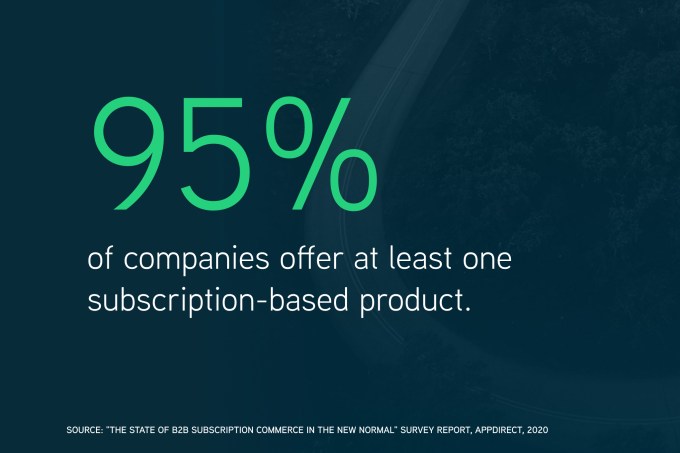You don’t need to look much further than your credit card statement to see that subscriptions are big business. Almost everyone subscribes to something, and as a result, recurring services have become a global business juggernaut. In fact, the e-commerce subscription market—everything from Netflix, to Stitch Fix clothing, to Blue Apron meals—is on track to reach a projected value of almost $247 billion by 2025.
But the consumer subscription products so many of us use are only one part of a much larger opportunity. Companies are also subscribing to an increasing number of recurring services, so much so that, of the $13 trillion global spend on business to business (B2B) products and services, $2.2 trillion will be digital. There is a massive opportunity for technology merchants to capture their piece of that pie, and the time has never been better to offer recurring services targeted to business buyers.
But, seller beware: B2B companies that try to spin up a subscription strategy based on what works for consumers are in for a bumpy ride. Not all subscriptions are the same, and here’s what you can do to avoid falling into the consumer subscription trap.
E-commerce subscriptions versus subscription commerce
Is it really worthwhile to draw distinctions between consumer and business subscriptions? After all, if it gets charged periodically like a subscription, and delivers a product periodically like a subscription, it’s still a subscription, right?
Not really, and here’s why: Despite the magic that happens on the backend—with seamless transactions flowing through payment gateways—most consumer subscriptions, like the ones we’re used to when we sign up to a streaming service, are still fairly simple. One person gives one company payment information, usually a credit card, and receives a product in return. These are e-commerce subscriptions.
Recurring business services, on the other hand, encompass layers of additional complexity that put them in a different category altogether. Take how companies buy subscriptions, for example: Many SaaS products are purchased indirectly, through resellers, referral partners, or distributors. Then, when it comes time to pay, procurement departments need a range of options, from credit cards, to ACH payments, to traditional invoices. Moreover, entering into a contract for a B2B subscription often requires quoting, negotiation, and approval from many departments, not just an email address and password.
This extra complexity is what defines true subscription commerce, and sets it apart from other models.
Is your technology stack ready for subscription commerce?

The world is becoming more “subscribed” everyday, and for B2B technology merchants, offering subscription products is quickly becoming table stakes. In fact, 95 percent of companies offer at least one subscription-based product. For companies that get it right, the benefits can be substantial, from more revenue, to better customer retention, and more.
The question is not if to pursue a subscription commerce strategy, but how. And for this, you need to think bigger, much bigger than simply updating your subscription billing tool. You can have a great billing solution, but without a larger subscription strategy and platform, your digital commerce efforts will fall short.
Beyond billing, you’ll need capabilities that can handle, at a minimum, CRM, online marketplace sales, onboarding, identity and access management, spend management, analytics and reporting, as well as APIs that can integrate all of this with your existing business systems. In short, you’ll need technology designed from the ground up for subscription commerce.
Making it simple to sell B2B recurring services
If all of that sounds daunting, it’s because it is. But you don’t need to cobble together a solution from scratch. Here, e-commerce has shown the way with user-friendly platforms that make it easy to sell retail products. Shopify is a prime example; the company offers a one-stop platform that offers everything a business owner needs, from a digital storefront, to checkout, to email marketing, and even digital finance, to sell online.
For B2B technology merchants, this is where companies like AppDirect are stepping in to fill the gap. The AppDirect platform offers all of the capabilities companies need to sell and manage recurring business services, including billing, online marketplaces, customer support, an extensive catalog of ready-to-sell solutions, and more, all purpose-built for subscription commerce. For e-commerce, there’s the Amazon Marketplace or Shopify, but for digital recurring services, there’s AppDirect.
The German telecom giant Deutsche Telekom provides a real-world example of how big a difference a platform like AppDirect can make. With AppDirect, Deutsche Telekom was able to launch a SaaS marketplace in only three months, and after launch, the company was able to bring over 40 new cloud services to market in just 12 months. “We quickly came to the conclusion that we weren’t able to develop the technology on our own,” says Lutz Fröhlich, Vice President of Digital Services at Deutsche Telekom. “We found AppDirect to be the most promising. The fact that the platform can adapt to changing needs is very important to us.”
The complexity of subscription commerce is real, but it shouldn’t scare you away from the business as a whole. The upside for companies that get it right can be tremendous: increased revenue, a big competitive advantage, higher investor valuations, and that’s just the beginning. If you’re ready to jump in, consider a platform like AppDirect to help you get there faster.
































